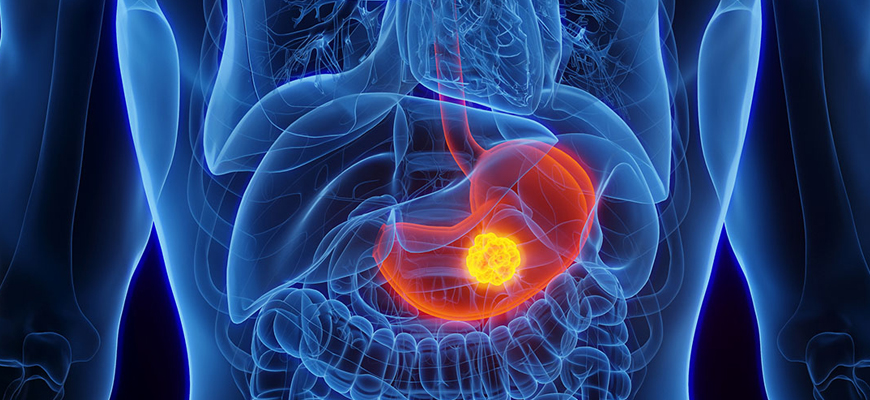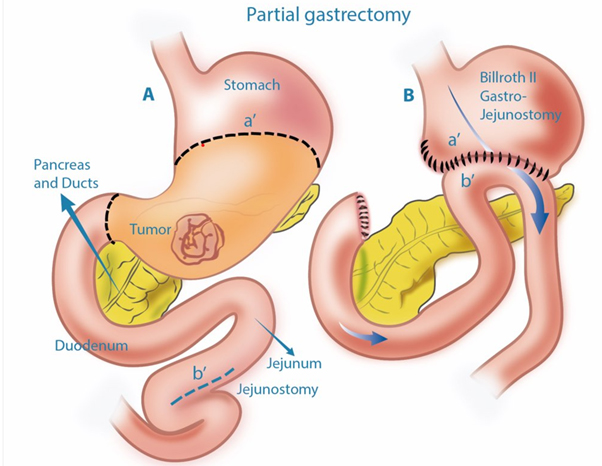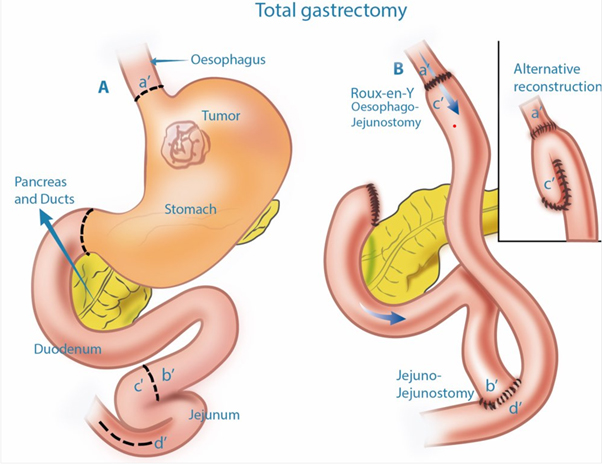
Gastric Cancer
Gastric cancer is the fifth most common cancer in the world and the third leading cause of cancer death in both sexes worldwide. Stomach cancer is more common in men than in women and tends to occur mainly in older people. Most people who develop stomach cancer are over the age of 55.
Risk factors :
- H Pylori infection
- Obesity
- High salt, nitrate consumption, and smoked foods
- Smoking
- Menetrier disease
- Chronic atropic gastritis
- Gastric adenomatous polyps
- Radiation exposure
- Prior Gastric surgery
- Familial gastric cancer
- Precursor lesions (dysplasia/ metaplasia)
Signs and Symptoms :
- Fullness in abdomen after meals, heart burn
- Progressive dysphagia ( difficulty in swallowing )
- Early satiety (sense of fullness after eating)
- Progressive unintentional weight loss.
- Loss of appetite
- Persistent vomiting.
- Chronic gastrointestinal bleeding usually presents as black stools (melaena) or dark blood.
- Iron-deficiency anaemia.
- Epigastric mass ( mass in upper abdomen).
- Advanced symptoms may include jaundice, ascites(fluid within abdomen), Intestinal obstruction.
Diagnosis of Stomach cancer
Your Doctor will do physical examination of whole body, abdominal examination to look for any palpable mass, free fluid within abdomen.
Patient will be asked to do certain blood tests. Other specific tests includes :
- Upper GI Endoscopy and Biopsy : Endoscopy is done to map the disease inside the stomach and to take the biopsy.
- Endoscopic Ultrasound (EUS) : If early disease is suspected or if early vs locally advanced disease needs to be determined. Also in cases where the disease is submucosal, EUS helps to take targeted biopsy from the most suspicious areas.
- Imaging (CT / PET CT scan) To stage the disease and rule out any metastatic disease.
- Staging Laproscopy : is recommended in all patients with bulky tumors of distal stomach , all proximal stomach cancers to stage the disease before starting chemotherapy. In this, entire peritoneal cavity is inspected and peritoneal cytology is taken.
Treatment :
All patients with gastric cancer should be screened for nutritional deficiency and consideration of nutritional support.
Management :
The treatment advised for each case depends on various factors, such as:
- How large the cancer is ?
- Whether it has spread (the stage of the cancer) to other parts of body
- Patients general health.
Surgery :
Surgery is the treatment of choice for gastric cancer. The most important indicator for resectability and survival after surgery is early diagnosis and therefore early stage of disease at operation.
Very early stage disease can be treated with Endoscopic Mucosal Resection. Subtotal or Total Gastrectomy will be performed based on the location of the tumour.
Distal (antral) tumours should be treated by Subtotal gastrectomy (part of stomach is preserved) and proximal tumours by Total gastrectomy (whole of the stomach is removed). Adequate D2 Lymphadenectomy should be performed for all cases. Limited gastric resections should presently only be used for palliation or in the very elderly.


Chemotherapy :
Perioperative combination chemotherapy (chemotherapy is given before and after surgery) has become the standard of care for localised gastric cancer.It has become a game changer in the management of stomach cancers. Availability of new drugs have improved outcomes and survival rates of stomach cancer.
Adjuvant chemotherapy may be helpful in high-risk patients, especially those who have not had neoadjuvant chemotherapy.
Radiation therapy :
Radiation is offered to patients in post operative setting when margins are positive, inadequate lymphadenectomy has been performed or multiples nodes are positive for the disease.
Stomach Cancer Prognosis :
Without treatment, a stomach (gastric) cancer is likely to get larger, and spread to other parts of the body. If it is diagnosed and treated at an early stage (before growing through the wall of the stomach or spreading to lymph nodes or other areas of the body) then there is a good chance of a cure with surgery as surgery is the only curative option. If the cancer is diagnosed when it has spread to other parts of the body, a cure is less likely. However, treatment can often slow down the progression of the cancer.
General issues in stomach cancer survivors
- Weight loss
- Diarrhoea
- Fatigue
- Indigestion
- Vitamin B12 and Iron deficiency
- Postprandial fullness
Counselling regarding healthy behaviour and Lifetyle modification
- Small meals and frequent meals
- Avoid late night meals or immediately before going to bed
- Maintain healthy weight
- Adeuate physical activity
- Limit alcohol consumption
- Smoing cessation
-
Is gastric cancer hereditary?Gastric cancer can be hereditary, but it is uncommon. If you have a family history of gastric cancers, it is imperative to work with your primary care physician to review the history and determine if there is a need for further testing.
-
Is Stomach Cancer Curable if Caught Early?Stomach cancer is usually most treatable when it is found early, before the cancer has spread to other parts of the body. Sometimes, surgery is all that is needed to treat stomach cancer in its earliest stages, though other treatments like chemotherapy, radiation therapy and molecularly targeted therapy may also be included in a patient’s treatment plan.
-
How often should I follow up after my treatment is completed?You must follow up at 6 monthly intervals up to 5 years after completing treatment for gastric cancer. The usual tests area CBC, B12 levels, chest Xray and ultrasonography or CT scan of the thorax, abdomen and pelvis.
-
What Should I Expect After Stomach Cancer Surgery?Lifestyle changes after stomach cancer surgery patients may need to adjust their diet or take vitamin supplements to ensure their nutritional needs are being met.
